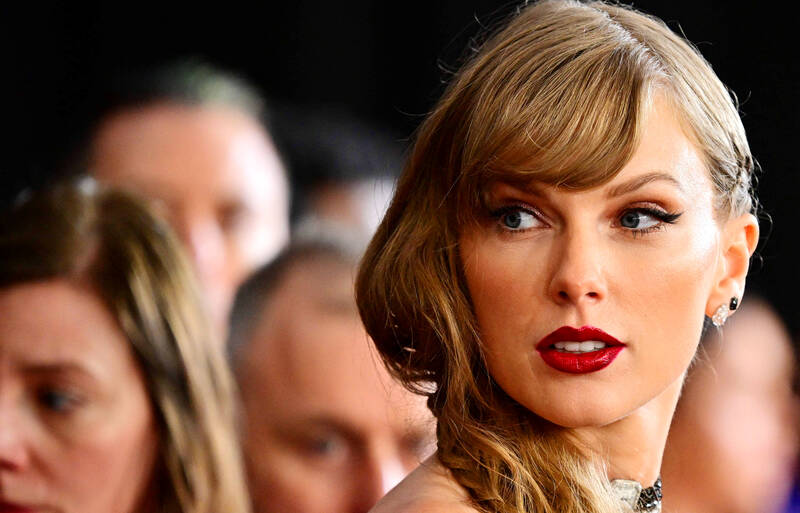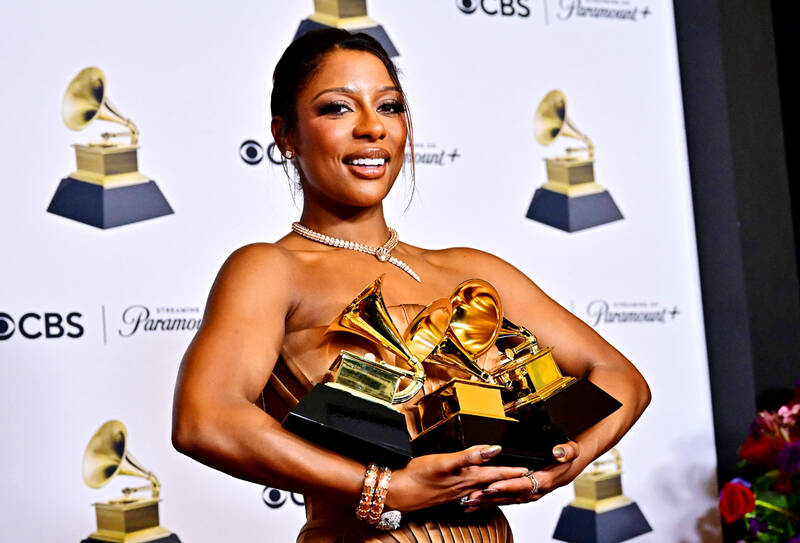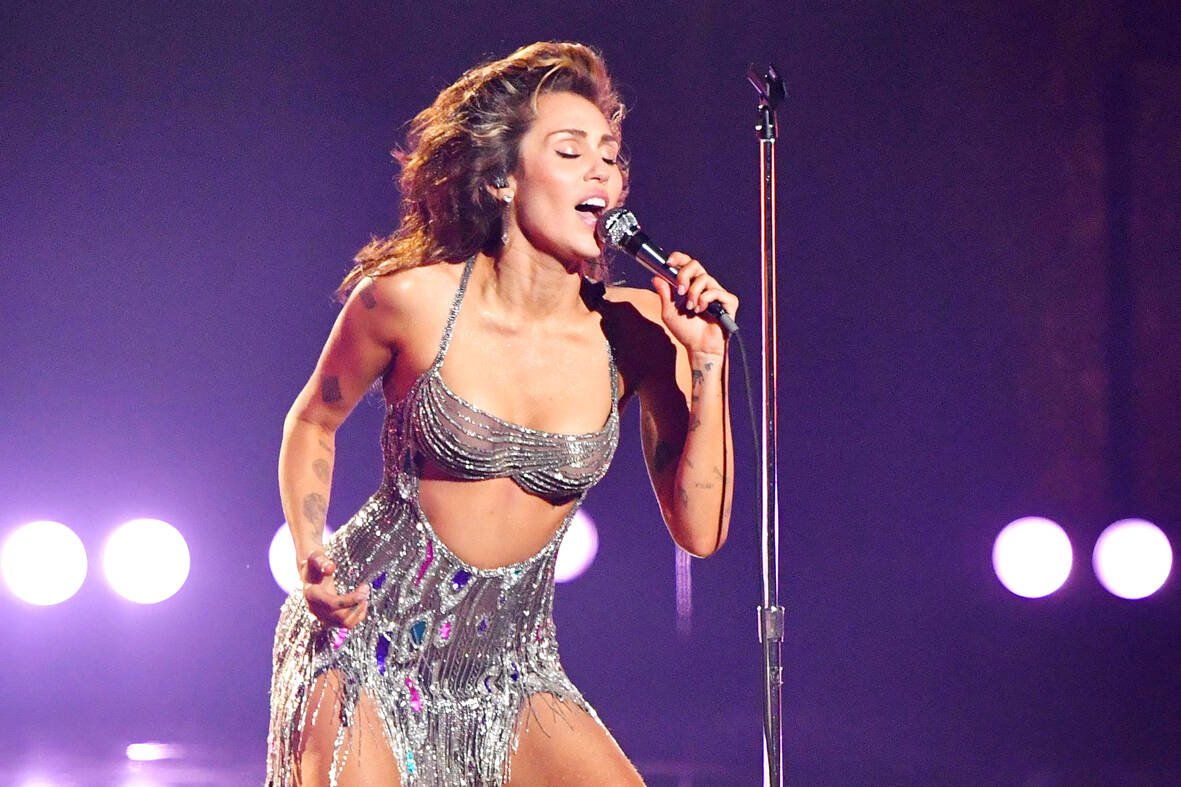It’s Taylor Swift’s world, and she just allows us to live in it.
After weeks where she attracted endless attention for her football star boyfriend and a mystifying right-wing campaign against her, the Grammy Awards put the focus squarely back on her art. Midnights earned Swift her fourth career Grammy for album of the year on Sunday, an achievement no one can match.
It breaks a tie with Frank Sinatra, Paul Simon and Stevie Wonder, who each won the honor three times.

Photo: AFP
“For me, the award is the work,” she said. “All I want to do is keep doing it.”
And she will (more on that later). Swift was the last example of an action-packed show where women earned the biggest honors and had the majority of the most memorable performances. Miley Cyrus powerfully belted Flowers, which won record of the year. Billie Eilish’s ballad from Barbie, What Was I Made For? was song of the year for her and co-writer Finneas O’Connell, her brother. Singer-songwriter Victoria Monet is best new artist.
There were so many riches that rock supergroup boygenius, with Julien Baker, Phoebe Bridgers and Lucy Dacus, won three Grammys and didn’t even make it onto the CBS portion of the show.

Photo: AFP
Making the best pop vocal solo performance the televised show’s first award — where all five nominees were women — was a savvy hint to what was coming.
TRACY’S TURN
Bringing the reclusive Tracy Chapman on to duet with country singer Luke Combs, who had a massive hit covering her Fast Car this past summer, was spine-tingling. In a pre-taped segment leading into it, Combs eloquently described what the song meant to him growing up. Clearly moved, Chapman’s eyes glistened when the crowd roared as she played the 1988 song’s unforgettable guitar riff. She’s kept to the background as Combs brought the song to a new generation, and chose a wise place to reemerge.

Photo: AFP
SOME FLOWERS FOR MILEY
Not to diss more elaborately-staged affairs, but there was a certain power to Cyrus’ performance of Flowers. It was just her and the song, essentially. There was no question she could carry it, and she even inserted a couple of ad-libs: “I just won my first Grammy!”
Her acceptance speeches were packed with personality. “I don’t think I’ve forgotten anyone,” she said, after a requisite list of thank-yous, “but I may have forgotten underwear.”
JAY-Z NEVER FORGETS
In accepting the Dr Dre Global Impact Award, Jay-Z proved he has a long memory. He recalled the times that rap artists were outspoken about not getting enough attention from the Grammys commensurate with music sales, even boycotting a show — although “they went to a hotel to watch the Grammys,” he said. “It wasn’t a great boycott.”
Jay-Z considers it an injustice that his wife, Beyonce, has never won album of the year despite her astonishing haul of 32 Grammys. “When I get nervous,” he said, “I tell the truth.”
JONI’S RETURN
Joni Mitchell’s return to the stage earned her a Grammy and her performance Sunday was another emotional highlight. Surrounded by musical friends like Brandi Carlile, the 80-year-old Mitchell sat in an easy chair that resembled a throne, tapping her cane as she sang Both Sides Now. Her voice, which she had to recover after suffering a brain aneurysm, brought a richness and perspective to the song that could only be hinted at in the original. Like Chapman, she was visibly moved by the audience’s reception, betrayed by laughter after she finished.
TOUCHING TRIBUTES
Let’s be honest, those “in memoriam” tributes to people who died in the past year usually signal that it’s time for a bathroom break. Not so here. Stevie Wonder honored Tony Bennett on a chilling “duet” with a filmed Bennett on Wonder’s For Once in My Life, then sang Bennett’s The Best is Yet to Come. Annie Lennox, saluting Sinead O’Connor, sang Nothing Compares 2 U, with two of the late songwriter Prince’s accompanists. And Fantasia Barrino shook the walls with Proud Mary to honor Tina Turner.
LATE ‘LIGHTS’
The Grammys no doubt intended Billy Joel’s performance of his first new song in 30 years, Turn the Lights Back On, to be a big show-capper. But the Grammys’ previous three hours were a hard act to top.
HARD WORK
To the public, it sometimes seems that stars arrive suddenly, but Monet and SZA offered charming reminders of all the hard work and dreams that go into success. After disarmingly thanking “the champagne servers of tonight,” Monet described the 15-year journey that took her to a best new artist award.
“My roots have been growing underneath the ground for so long — and I feel like today I’m sprouting,” she said.
There was a brief pause before SZA accepted an award for best R&B song, since she was changing backstage. But she was overwhelmed after recalling, with the trophy presented Lizzo, the days a decade ago when they opened shows in small clubs. She hustled offstage when the tears flowed.
“I’m not an attractive crier,” she said.
PROMO TIME
Yes, we understand that artists are always on the lookout to promote their work. But when Swift took time in accepting an award to announce that her new album would come out in April, and said she would share cover art on social media, it felt ... cheap. Like she was hijacking the event for her own purposes, with news she knew would overshadow much of what was happening. U2, beamed in from a concert at their Las Vegas residency, felt like they were promoting an arena instead of their own work, lost as they were in the razzle-dazzle. Two forgettable moments for two big stars.
TREVOR KNOWS
Props to Trevor Noah for his job as host. His enthusiasm for the music world can seem puppy dog-like, but it beats insult comics and ironists. Opening the show from the arena’s floor, walking around to point out the stars, Noah built spirit for people there and at home alike. He got in some good lines, too, like when he noted Universal Music was removing its artists from TikTok.
“How dare you rip off all the artists,” he said. “Shame on you. That’s Spotify’s job.”
As Swift arrived late, he said that as she walked in the room, “the economy around these tables improve. Lionel Richie becomes Lionel Wealthy.”
Unlike her glares that torpedoed Jo Koy at the Golden Globes, Swift appeared to be enjoying Noah.

Exceptions to the rule are sometimes revealing. For a brief few years, there was an emerging ideological split between the Democratic Progressive Party (DPP) and Chinese Nationalist Party (KMT) that appeared to be pushing the DPP in a direction that would be considered more liberal, and the KMT more conservative. In the previous column, “The KMT-DPP’s bureaucrat-led developmental state” (Dec. 11, page 12), we examined how Taiwan’s democratic system developed, and how both the two main parties largely accepted a similar consensus on how Taiwan should be run domestically and did not split along the left-right lines more familiar in

As I finally slid into the warm embrace of the hot, clifftop pool, it was a serene moment of reflection. The sound of the river reflected off the cave walls, the white of our camping lights reflected off the dark, shimmering surface of the water, and I reflected on how fortunate I was to be here. After all, the beautiful walk through narrow canyons that had brought us here had been inaccessible for five years — and will be again soon. The day had started at the Huisun Forest Area (惠蓀林場), at the end of Nantou County Route 80, north and east

Specialty sandwiches loaded with the contents of an entire charcuterie board, overflowing with sauces, creams and all manner of creative add-ons, is perhaps one of the biggest global food trends of this year. From London to New York, lines form down the block for mortadella, burrata, pistachio and more stuffed between slices of fresh sourdough, rye or focaccia. To try the trend in Taipei, Munchies Mafia is for sure the spot — could this be the best sandwich in town? Carlos from Spain and Sergio from Mexico opened this spot just seven months ago. The two met working in the

This month the government ordered a one-year block of Xiaohongshu (小紅書) or Rednote, a Chinese social media platform with more than 3 million users in Taiwan. The government pointed to widespread fraud activity on the platform, along with cybersecurity failures. Officials said that they had reached out to the company and asked it to change. However, they received no response. The pro-China parties, the Chinese Nationalist Party (KMT) and Taiwan People’s Party (TPP), immediately swung into action, denouncing the ban as an attack on free speech. This “free speech” claim was then echoed by the People’s Republic of China (PRC),